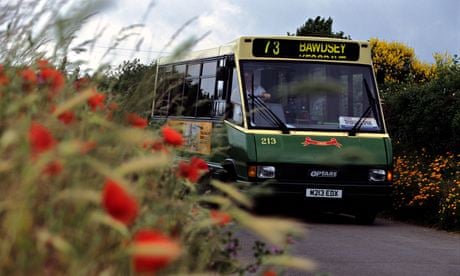Local bus services are being slashed or withdrawn across England because taxpayer funding has dropped by almost a quarter since 2010, a Labour survey has found. Freedom of information requests showed councils had cut cash for services by more than half in some areas, forced to make savings due to smaller government grants.
The highest cuts included a 55% drop in Northamptonshire, 50% in Suffolk, 40% in Hertfordshire and 37% in Somerset, said Hilary Benn, the shadow communities secretary. He said it was clear that vital frontline services were "disappearing dramatically as cuts to councils intensify".
Benn added: "David Cameron needs to get a grip and ensure that elderly and disabled residents are able to get the bus to their local villages and towns and are not left stranded at home."
MPs on the Commons transport committee previously warned that reduced or withdrawn local bus services had "made people more socially isolated, in some cases removing the only bus link between their village and the nearest town".
The committee said withdrawn bus services meant elderly people had no public transport access to hospitals and health facilities, social activities and shops.
"Several could not drive nor afford taxis on a regular basis. People could no longer visit or assist sick relatives as frequently.
"Commuters described the difficulties they now faced to return home from work in the evening following the curtailment of their local bus service after 7pm.
"We were given examples of younger people changing their employment due to bus service reductions and withdrawals, or no longer being able to socialise, play sports or access educational facilities in neighbouring towns, reducing their independence."
A Commons briefing paper also outlined concerns about whether local authorities could sustain previous levels of spending on subsidised bus services.
"Campaigners have pointed to service reductions that have occurred as the result of budget cuts, while the government has insisted that local authorities now have more autonomy to make choices about how they spend their budgets and it is up to them to prioritise services for their areas," it added.
A government spokesman said: "We know that rural bus services are vital, including for many older and disabled people. That is why the right to free travel is enshrined in law and government provides funding to meet the cost of subsidising off peak travel for these groups.
"In addition, the Department for Transport provides substantial funding to bus operators to help more services run and keep ticket prices down. The current level of this funding is protected until 2015/16, in rural areas as it is elsewhere."

Comments (…)
Sign in or create your Guardian account to join the discussion